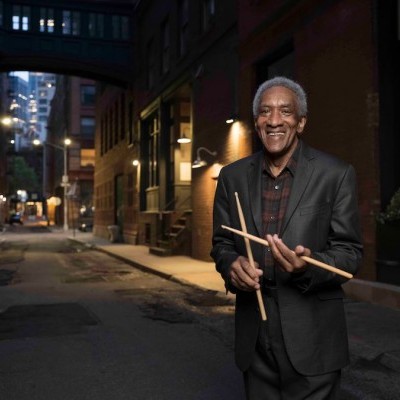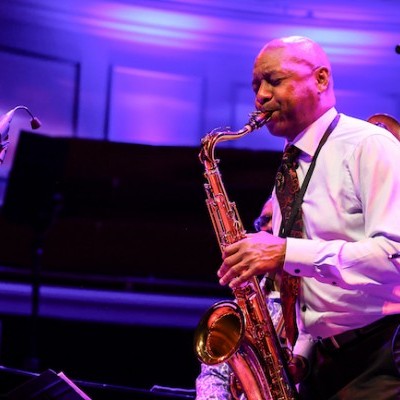Jun 3, 2025 11:25 AM
In Memoriam: Al Foster, 1943–2025
Al Foster, a drummer regarded for his fluency across the bebop, post-bop and funk/fusion lineages of jazz, died May 28…

“I have no concept of what I did before! That’s irrelevant,” Ibrahim said. “I can’t change anything. I can’t change the past, I can’t change the future, I can only deal with what is now.”
(Photo: Michael Jackson)It is 2022. The pandemic lingers, yet life is moving forward in unexpected ways.
The necessary move to video correspondence has allowed an opportunity for this writer from Los Angeles to travel virtually to a small town outside of Munich, Germany, to speak face-to-face with a storied figure in the annals of jazz — a bona-fide Jazz Master, according to the National Endowment of the Arts, a U.S. organization that bestowed that title on Abdullah Ibrahim in 2019. A year after his triumphant appearance at the Kennedy Center in Washington, D.C., for the NEA awards ceremony, the South African pianist and composer’s plans were derailed by COVID-19 restrictions. An 86th birthday concert back in Germany instead became a recording session where Ibrahim played alone in the intimate performance space that otherwise would have been filled to its 350-seat capacity.
When asked how different it was to be performing in an empty room, he answered dryly, “I do it all the time. When I started, no one wanted to come hear me play. I played to empty houses.” He bursted into joyous laughter. “And sometimes,” Ibrahim continued, struggling to speak through his chortles, “the houses were full, and they would empty when I started playing! Whether they are full houses or empty houses, it doesn’t matter.” He is factually correct in this case, for the resultant album, Solotude (Gearbox), has been heard by more than could ever fit in that space in Söllhuben, a moment in time preserved as a masterpiece to the world.
Yet, Ibrahim’s viewpoint that crowd size doesn’t matter is rooted in more than fact. “Let me put it this way,” he explained. “We invest in loss. It’s a strange concept. If you invest in loss, that takes care of the ego, because you don’t expect anything in return. Once I strike [a] note, there’s nothing I can do about it. I make my intention as clear and as truthful as possible. This is the idea of investing in loss. Since you don’t expect anything in return, when you strike the note, you do so with the utmost sincerity. The idea is that we have to be cognizant and careful about what you say and do.”
Clear intentions are evident on Solotude. Gone from his playing are the physically demanding displays of bombast and endurance from his heroic solo piano ruminations in the 1970s (perhaps a model for another solo-piano marathoner making a splash at that time, one Keith Jarrett). Now, Ibrahim’s intention seems to be to induce an unhurried stream of melody and harmony, weaving tunes from the corners of his long life and career together into a singular tapestry of sustained thought. One piece will melt into another and back in a gentle hypnotic dance, conjuring a null-field of timelessness that extends to infinity in all directions, something unknowable yet familiar … and profoundly peaceful.
The gentle-giant approach comports with Ibrahim’s current relationship to the piano. “The physical idea of sitting every day and practicing 20 hours — I used to do that. Now, it’s not necessary. As with everything else,” he clarified, “you continually try to get rid of all the unnecessary things, and you’re just left with the bare tools that you use to express. It takes a minute … or two … a couple of years,” he quipped, laughing. “There’s a deep joy and an ongoing revelation. I’m using my own breath.”
Already dealing in lofty principles, Ibrahim began to escalate into outer space. “It’s an illusion that there is moonlight,” he said. “What we perceive to be changes in the moon, the phases of the moon, it’s also an illusion. In this massive universe, we are small little specks. It is designed that we can only function in the sphere of illusion, because the reality is so massive that we would not be able to bear it because it is so immense and awesome. The moonlight and the illusion help us some to find a glimpse of that vast reality. Every now and then, we are able to experience it, and that is what happens when you play music, and this genre of music we call improvisation, and we call jazz.”
Any perceived familiarity for those who have followed Ibrahim’s output as of late might stem from his prior release, 2019’s Dream Time (Enja), a solo piano album recorded in celebration of his 85th birthday, in the same hall that he returned to a year later for Solotude. The two albums are eerily similar in tone, tenor, and tunes — it would be difficult to tell them apart in a Blindfold Test.
When asked about the reasons behind releasing essentially an encore studio performance of a prior concert, Ibrahim answered coyly, “Well, that’s what we do best.” An awkward silence, followed by a clumsy attempt to ask the same question was met with more words but less clarity.
“Here we are again with this concept of illusion. The illusion that we also have with time. What is past is past, and what is future … in our understanding, there is no past and there’s no future, there is only now. Which is also the principle of the [curvature] of time and space. In Africa, this is what our wise, old mentors and elders taught us. Let me put it this way: When I go to school, the first person to teach me is the teacher. The teacher says to me, ‘1 plus 1 is 2.’ Now, in the [African] tradition, our first teacher is the master, and the master says, ‘This is 2.’ So then under his guidance, you have to figure out how to get to ‘2.’ That is your life experience. So, ‘1 plus 1 is 2,’ that is information. The master says, ‘This is 2,’ and you spend your whole lifetime, under his guidance, to get to ‘2.’ That is knowledge.”
Ibrahim might be shading his response with a little moonlight of his own. I try — against his philosophical intentions — to once again to address the initial question. The corners of his mouth turn down in disapproval, looking very much like a small green Jedi master trying to explain to his padawan how it was not impossible to Force-pull his X-Wing out of the swamp. “We are dealing with the same thing, this time, this time,” he chastises me in quasi-Yoda-syntax. “There’s no past and no future, so why would I want to go back there and recapture something that was past?” Which was exactly the question this interviewer was getting at. “I’m dealing with now … I have no concept of what I did before! That’s irrelevant. I can’t change anything. I can’t change the past, I can’t change the future, I can only deal with what is now.”
Days after this exchange, insights emerged that I struggled to comprehend in the moment. If one can somehow release past and future from the present, can there be little memory of a concert a year prior? Given a life dedicated to a consistency of intention and faithfulness to oneself, wouldn’t the combination of those things result in a near-identical musical portrayal? If you are truly most like yourself (as Ibrahim’s own muse Thelonious Monk once remarked was the hallmark of genius), your artistic actions and decisions would be uncannily consistent, wouldn’t they? (Monk himself performed and rerecorded his same works repeatedly throughout his life.) If time is indeed an illusion, the live version of a studio recording could occur either before or after the fact, right?
Furthermore, the moonlight of all these ethereal higher-plane thoughts is certainly preferable to the muddy trenches of the business of music. Given that, we should be content to simply accept “2,” rather than dwell on whatever number-crunching it took to achieve that outcome.
Ibrahim is no stranger to Germany, or all of Europe for that matter. In 1962, with the apartheid South African government persecuting his band the Jazz Epistles (which included trumpeter Hugh Masekela), Ibrahim fled in exile with his soon-to-be wife, Sathima Bea Benjamin (who passed away in 2013), settling in Zurich, Switzerland. “I met everybody in Zurich,” he recalled, citing luminaries like Count Basie, Art Blakey and, of course, Duke Ellington, who shepherded Ibrahim (then still known as Dollar Brand) and his trio to France to record their breakthrough album Duke Ellington Presents The Dollar Brand Trio (Reprise, 1963). He recalled meeting John Coltrane in Zurich, which was big for him, having been profoundly moved by his music. Ibrahim read aloud a poem about Giant Steps, Coltrane’s signature album, released in February 1960:
“In New York that day, a premonition that something astounding was about to happen.
“In the late afternoon, word started trickling in from the recording session.
“A seismic realignment and reaffirmation of our shared individual and collective tonal centers.”
Were those words from Coltrane himself? “No, me. I wouldn’t ascribe something so banal to Coltrane.”
Ibrahim recorded with Coltrane’s drummer, Elvin Jones, on Jones’ own album Midnight Walk (Atlantic, 1966), contributing one of his compositions, the waltz “Tintiyana.” It’s fascinating to hear Jones, his brother and trumpeter Thad Jones and saxophonist Hank Mobley navigate the fiendishly tricky melody and form. It might be the most hard-bop playing by Ibrahim on record. At that time, he usually reflected an older school of pianists — Meade Lux Lewis, Albert Ammons, Ellington, Monk, Herbie Nichols.
“They edited my solos,” Ibrahim said. “I’m not supposed to sound like that. I’m South African, I don’t have the mental capacity [laughing hysterically] to be able to play something like that.” Thinking about Elvin Jones led Ibrahim to recall playing with two other drummers, Ed Blackwell and Billy Higgins. He and Benjamin had moved to New York at that point, and Ibrahim soon found himself in more radical company: Don Cherry, Archie Shepp, Cecil Taylor, Pharoah Sanders and Ornette Coleman, who all embraced his ferocious improvisatory spirit and his compositions inspired by South African traditional music.
“It was a joy and an honor to play with Billy Higgins and Ed Blackwell,” he remembered fondly. Cherry and Blackwell appear with Ibrahim on The Journey (Chiaroscuro, 1977), while Higgins was the drummer on Mindiff (Enja, 1988), recorded for the film Chocolat. The title track is the first tune Ibrahim plays on Solotude.
When asked about the recent passing of South African Archbishop Desmond Tutu, Ibrahim recalled, “My grandmother was a founding member of the AME [African Methodist Episcopal] Church in Cape Town.” That was his first experience regarding the church, with which Tutu’s African Anglican Church was, and is, also affiliated. “But we also had our tradition,” he said. “My great-grandfather knew everything about the herbs, and the plants and the animals. My grandfather spoke all the Southern African languages fluently. Here we [were] in a system that says, ‘Everything is now going to be apart. You’re going to live there, and we will live here.’ And then our mentors made us understand that this is totally idiotic, because how can you sow anything out of the universe — where would you put it? And then our mentors told us, ‘They are not our teachers.’ And then they told us what is actually occurring, and how we can transcend. As young people, we were very angry. We wanted to make change. I wrote songs about that time, about what young people felt, what they needed to do, and people were angry.”
Circling back to the original topic, he continued, “You talk about Desmond Tutu, but there are hundreds of spiritual mentors there that guided us. And they say to us, ‘Don’t tell anybody about us, we want to remain anonymous.’ And that is the tradition of the mentor,” he concluded. “The mentor remains anonymous. That’s why I am not anonymous,” he chuckled. “Some time, I’ll disappear from all your books.”
If Ibrahim’s intention is to move toward anonymity, he is doing a terrible job of it. In addition to his high-profile induction as an NEA Jazz Master, he will have at the time of this writing recorded a solo performance at his home in Germany on his Fazioli grand piano, to be broadcast on NPR’s Tiny Desk video series. Upon hearing that this was one of the most-watched live music streaming platforms in the world, the octogenarian artist reacted with mild surprise, with maybe an imperceptible glimmer of delight.
“We accept the accolades, but we understand that it doesn’t stop there,” he said. “Every time that it occurs it means that it’s the beginning of the continuation of that striving.”
What is he striving for? “It takes a long time to play one note,” he mused. “That’s what the striving is about: to play one note with absolute sincerity, devoid from ego. It’s a challenge, because there’s always the whisperer that tells you, ‘Wow, that was great.’ People say that you must annihilate the whisperer, but we say, ‘No, whisperer, stick around. Because you will keep us on our toes.’ The whisperer always tells you how great you are. The quest is always to get past that so we can try to be sincere.”
At one point, he looked to his left and asked the woman sitting quietly beside him during the entire interview, “Does this make any sense?”
“Yes,” she answers. “But I know you very well.”
Not too many years ago, Marina Umari, from Germany, was finishing her last year of medical studies in Cape Town. “Somebody there knew I loved piano music, so they told me I had to go and listen to Abdullah Ibrahim before I go back home,” she said, with a slight smile. “And I listened.”
“She was warned that coming to my concert would have some consequences,” Ibrahim said, looking at her fondly. “Lovely consequences.” So, after returning to his homeland as a prodigal native son whom Nelson Mandela proclaimed as their very own Mozart, Ibrahim has once again left South Africa for Europe, this time on his own terms with a new companion, the two of them settling in this quiet village in Upper Bavaria. “We have shared dreams and wishes,” he said.
In fact, Umari is a driver of those dreams and wishes, and revealed to be part of the solution of how we “got to 2.” “It was Dr. Umari that really created this,” Ibrahim said about his recent solo piano excursions. “She’s the one who suggested [that I] play at the Hirzinger, and to get the piano — she’s the one. And of course, the owner of the venue is quite a remarkable person.” The owner he speaks of is from a family that has, for the past 500 years, run the Hirzinger Hotel in Söllhuben. It’s about a 20-minute drive from where Ibrahim and Umari live, and it is on that property where an old wooden barn has been repurposed into a large reception hall, a sometime performance space for Ibrahim’s concerts. “It’s a very beautiful place,” said Umari. “It’s not easy to get because almost everybody wants to get married there.”
“But we are blessed that we rely on people around me who are compassionate and [know] what we are hoping to achieve,” Ibrahim affirmed. Long steeped in Japanese philosophy and martial arts, he is a proponent of Ikigai, finding one’s life’s purpose. “Ikigai is the principle,” he explained, “that says, ‘When you wake up this morning, what is it that you would like to do?’ Not what someone else would like, what is it that you would like? Sometimes we go through the paces of living daily, and we never seem to reach that goal. With me, I’m blessed with having that possibility. I think we’ve all been designed to play our roles and interact with each other.”
So, after an unparalleled and historic musical journey, has Ibrahim discerned what his role has been on this Earth? “I have no idea,” he admitted, laughing heartily, as he had many times that day. “How is it that at 90 years of age, a master will say, ‘I wish God would give me another 200 years so I can perfect this thing’?” It’s not a question of trying to achieve something within a space of time.”
It’s a good thing, then, that time — like moonlight — is an illusion. DB

Foster was truly a drummer to the stars, including Miles Davis, Sonny Rollins and Joe Henderson.
Jun 3, 2025 11:25 AM
Al Foster, a drummer regarded for his fluency across the bebop, post-bop and funk/fusion lineages of jazz, died May 28…

“Branford’s playing has steadily improved,” says younger brother Wynton Marsalis. “He’s just gotten more and more serious.”
May 20, 2025 11:58 AM
Branford Marsalis was on the road again. Coffee cup in hand, the saxophonist — sporting a gray hoodie and a look of…

“What did I want more of when I was this age?” Sasha Berliner asks when she’s in her teaching mode.
May 13, 2025 12:39 PM
Part of the jazz vibraphone conversation since her late teens, Sasha Berliner has long come across as a fully formed…

Roscoe Mitchell will receive a Lifetime Achievement award at this year’s Vision Festival.
May 27, 2025 6:21 PM
Arts for Art has announced the full lineup for the 2025 Vision Festival, which will run June 2–7 at Roulette…

Benny Benack III and his quartet took the Midwest Jazz Collective’s route for a test run this spring.
Jun 3, 2025 10:31 AM
The time and labor required to tour is, for many musicians, daunting at best and prohibitive at worst. It’s hardly…